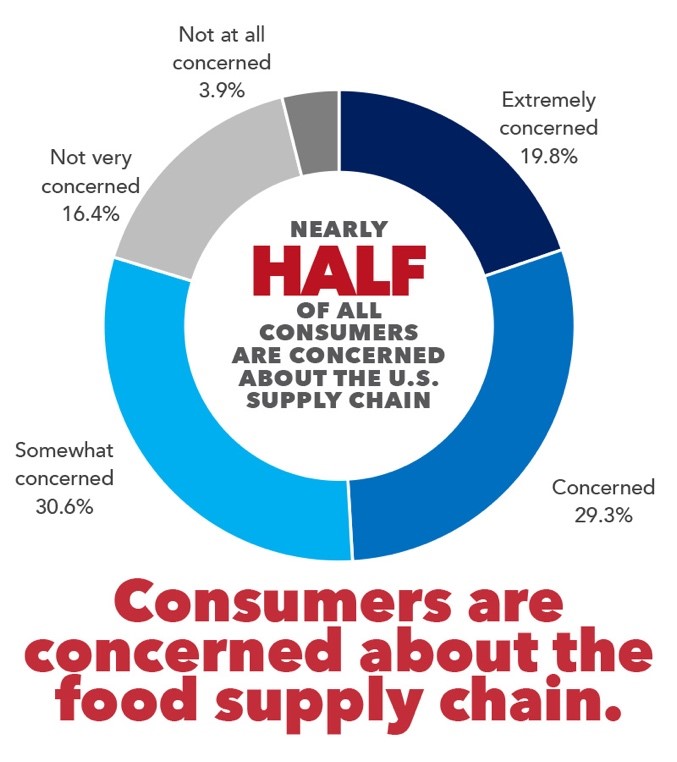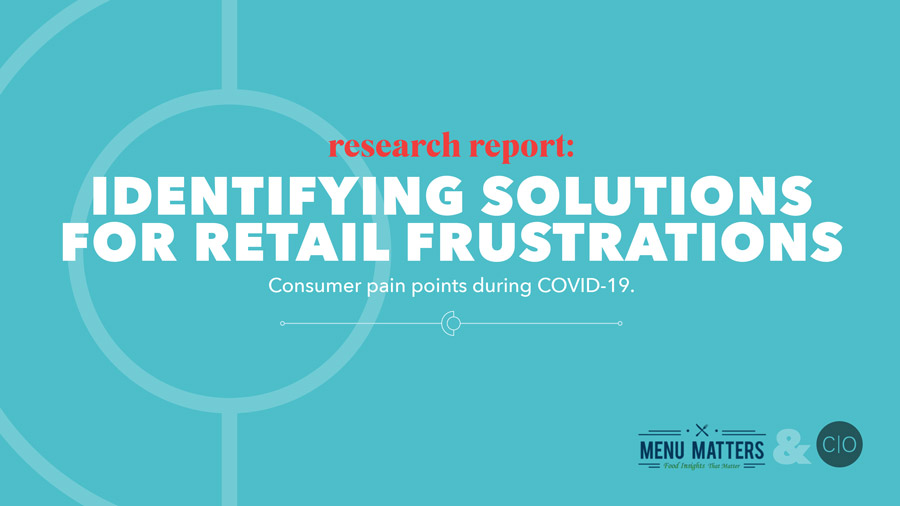If the world had to describe 2020 in a single word, it would probably be “disruption.” In countless ways, the COVID-19 crisis has upended nearly everyone’s personal and professional lives.
Foodservice, restaurants and businesses focused on this segment have obviously not escaped the pandemic’s impact. But what about grocery retail. How has this segment—as well as those who get food directly from manufacturers or farmers—fared during the global pandemic?
C|O partnered with Maeve Webster of MenuMatters to conduct a national poll to find out. More than 1,100 consumers from across the country, representing all age groups, were eager to share their experiences and opinions. Here are highlights from the full report that’s available for download.
Food supply unease.
Nearly half of all consumers are concerned about the U.S. food supply chain, likely driven by broad shortages during the height of the crisis and media coverage on the possibility of meat shortages. Most concerned: Gen Xers, as well as consumers in New England and south-central regions of the U.S.
Q: How concerned are you about the food supply chain in the U.S. with regard to safety, reliability, etc. as a result of the coronavirus crisis?

Shopping Fears.
Though the media often focuses on safety concerns related to restaurant visits, nearly 75 percent of consumers are concerned about catching the coronavirus when grocery shopping—and the level of concern is consistent across all consumer groups surveyed. This likely explains why half use pickup or delivery at least some of the time. As might be expected, Millennials have embraced both of these trends more so than any other demographic while Boomers are least likely to have used either.
Widespread Frustration.
Just under two-thirds find grocery shopping frustrating to some degree, with women and older Millennials (especially those with multiple younger children) most likely to be very or extremely frustrated by the experience. Retailers have an opportunity to broaden communication and take even more proactive steps to communicate with shoppers.
Out-of-Stock = Brand Erosion.
Virtually all consumers faced out-of-stock situations, with many finding new brands, products or categories that they will continue to buy post-pandemic. Due to spot shortages or supply disruptions, many consumers are finding new brands, products or categories that they intend to continue buying post-pandemic.
Worker Safety First.
Most consumers are concerned about the health safety of food industry workers—from agriculture through retail. And just over 23 percent are extremely concerned. With nearly 60 percent of consumers very to extremely concerned about food worker safety, the industry needs to address these concerns to ensure customer confidence and consumer good will, particularly with the emerging awareness of social justice issues.
Farmer Trust: An Encouraging Sign.
Trust in farmers remains high. More than half of consumer surveyed still trust farmers a great deal or completely—and overall trust in farmers is 87 percent.
COVID-19 and our food system—What’s next?
As our industry settles into the next normal, it is more important than ever to protect and build brands while embracing the need for clear, confident, transparent and useful communications. That’s what we do at C|O. Our strategic marketing and communications focus is targeted specifically to the needs of food and agriculture—up and down the supply chain.
Give us a call to dig deep into your markets, develop strategic approaches and then to help you reach your goals. Contact Mark Gale: mark.g@co-nxt.com for more information on this survey or to advance your brand efforts—farm field to dinner plate.
Download the full research report, Identifying Solutions for Retail Frustrations: Consumer pain points during COVID-19.
C.O.nxt Insight.
Our team of subject matter experts focuses on food and agriculture—farm field to processing to entrée on a plate. We can help you build a new brand, protect an old one or target customers to foster sales. Let’s talk when the time is right to handle your next strategic marketing and communications challenge: Marcy Tessmann, marcy@co-nxt.com.
SHARE THIS STORY
What Would You Solve in 30 Days?
Every brand faces moments when clarity, momentum, or alignment are lacking. Sometimes it’s a new product that needs a smart go-to-market plan. Other times, it’s a shift in the business that calls for a tighter

